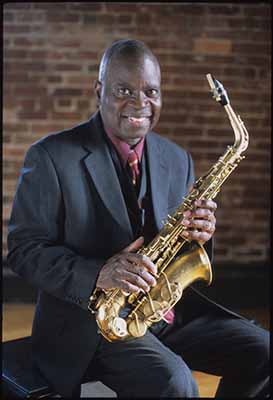by the North Carolina Arts Council.
Originally published in African American Music Trails of Eastern North Carolina, copyright 2013.
Republished with permission.

Saxaphonist Maceo Parker (born in 1943) and drummer Melvin Parker (born in 1944) are brothers born in Kinston. Rising from a musical family -- their father played piano and drums and their mother sang at church -- they both became key members of James Brown's band in the 1960s. Melvin Parker contributed a unique drumming style that helped define Brown's funk innovations, and he is considered a legend in funk and soul. Saxophonist Maceo Parker later formed his own band. After playing on and off with James Brown in the 1960s, Melvin Parker joined his brother's band.
Maceo Parker continues to tour and has received numerous awards. These include induction into the North Carolina Music Hall of Fame in 2011 and receipt of the North Carolina Heritage Award in 2016.
Kinston musicians helped shape the sound that became known as funk and propelled the James Brown Band to new levels of performance and recognition. Nat Jones, Dick Knight, Levi Raspberry, and the brothers Melvin and Maceo Parker were influential members of the James Brown Band. Maceo Parker, still a very popular musician, has a busy schedule of performances around the world.
Maceo and Melvin Parker trace their own musical beginnings to childhood experiences (growing up in Kinston).
Maceo recalls:
At a very early age, I knew people in your [own] family are going to be a little bit partial. You could sound like frogs, but it’s, “Oh, that’s cute! Oh, my goodness!” You know? But then when you get that from somebody on the other side of town who don’t really know you, to say, “Man, that’s all right,” then you start hearing. Some complete stranger says, “That’s not bad. That’s pretty good.” Then you feel like you’re sort of on the right road, and perhaps you can pursue some kind of career.
Melvin Parker, too, remembers that in their family, music started at an early age:
Mom and Dad used to have us give a play, a program, and it had to include music, and we would do that every Sunday morning on the front porch of the house—a little house at 121 Railroad Street. We used to do poetry and songs that we had learned in school or at Sunday School and church. And Mother and Daddy and anybody else in the family who were adults who viewed those presentations really made us feel that we were the best in the world, you know, the best thing that could ever possibly happen! And Daddy used to line us up. Well, there was Kellis, who was the oldest, and Maceo Jr. next, and then me, and then two years later, Delon. And Daddy would line us up in the front yard and teach us “Left face,” and “Right face,” and “About face,” and even doing half-lefts and half-rights and oblique moves. And we would march to time. And he had us doing so well at time that we could do silent cadence at probably—I must have been about four or five years old, and I could march to a silent cadence. But I didn’t realize that he was teaching us time and rhythm.
When they were children, Melvin, Maceo, and Kellis Parker found a place for their band to perform at the movie theater. Melvin Parker tells the story:
On Saturday mornings, we found a little talent show at the “colored” theater, the State Theater. We won that talent show a couple of times. It was sponsored by Maola ice cream. We wrote a little song about Maola ice cream, and we became the sort of house band for the talent show. All the kids in town would come to the State Theater on Saturday mornings to watch the Junior Blue Notes play at the Maola Ice Cream Talent Show. I don’t think we got paid! They would give us some ice cream and, of course, free tickets to the movie theater, and we enjoyed it. We were just having fun! And the song went something like this: Maola Maola ice cream Maola ice cream is a treat It really is hard to beat Everybody at school and all the kids in the neighborhood knew that song.Return to main page - African American Music Trails of Eastern North Carolina: Kinston Area